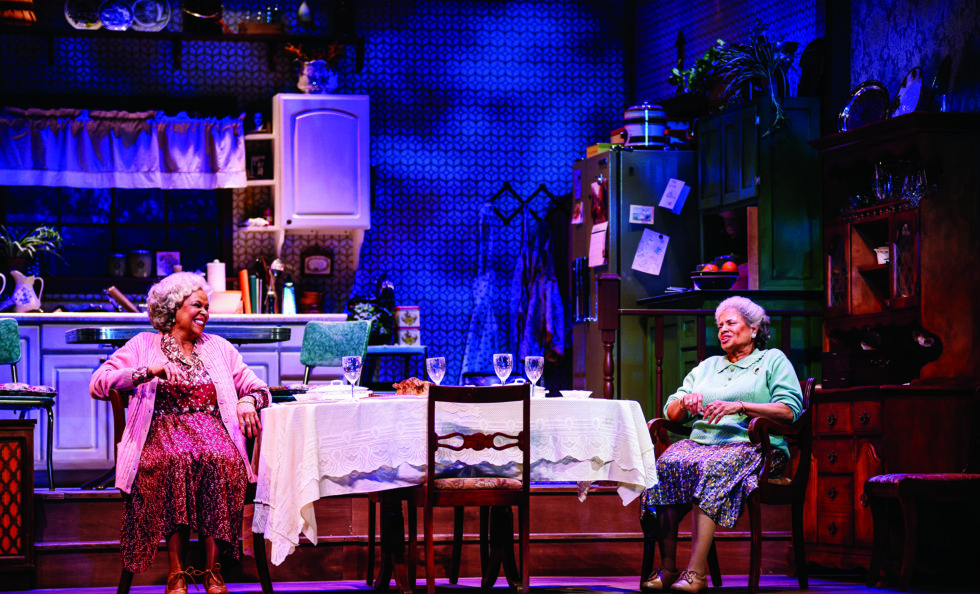Two Long-Time Friends Bring Legendary Sisters to Life
[/et_pb_text][/et_pb_column][/et_pb_row][et_pb_row admin_label=”row” _builder_version=”3.25″ background_size=”initial” background_position=”top_left” background_repeat=”repeat”][et_pb_column type=”4_4″ _builder_version=”3.25″ custom_padding=”|||” custom_padding__hover=”|||”][et_pb_text admin_label=”Text” _builder_version=”4.3.2″ background_size=”initial” background_position=”top_left” background_repeat=”repeat”]
Terry Burrell and Julia Lema in HAVING OUR SAY. Photo by K. Talley Photography
By RODNEY BRAZIL
The distinction of “sisters” can refer to several types of relationships: biological siblings, of course, but also members of the same church, women who back the same cause, and even friends who have a strong emotional bond. In Lyric’s production of Having Our Say, the spirit of sisterhood comes to life in many magical ways.
Terry Burrell and Julia Lema, two actresses known nationwide for their extraordinary stage work, make their debuts at Lyric Theatre of Oklahoma in Having Our Say, a play by Emily Mann. While new to Oklahoma, their careers span decades, including roles on Broadway and many of America’s most influential regional theatres.
The play Having Our Say premiered on Broadway in 1995, but the story deals with themes that have been timely for hundreds of years. In fact, while talking to Ms. Burrell and Ms. Lema about the show, we came upon countless moments in the play that resemble their own real-world experiences.
TERRY BURRELL: Having Our Say is based on the biography of the Delany sisters, Bessie and Sadie. The book came out of their interview with The New York Times. When the play begins, you meet my character, Bessie, when she’s 101 years old, and Sadie is 103. These two women are remarkable. They witnessed women getting the right to vote in the United States and the civil rights movement. Their father was a slave.

Terry Burrell in HAVING OUR SAY. Photo by K. Talley Photography
JULIA LEMA: They went through Jim Crow.
BURRELL: What’s so amazing is that at a very early age, they were introduced to the classics. They read Shakespeare.
LEMA: Learned to speak Greek.
BURRELL: This was not typical. Remember, it was just 45 years after Robert E. Lee surrendered, and slaves were freed. The fact that their family was able to stay intact is extraordinary.
The Delany sisters were ahead of their time, fervently devoted to maintaining good health without the help of today’s multi-billion-dollar self-care industry.
BURRELL: These women had incredibly healthy habits. They both did yoga every day which Sadie began in her 60s and Bessie at 80. They ate seven different kinds of vegetables and fruits a day and took vitamins and supplements.
Born in North Carolina, the real Sadie and Bessie Delany were sheltered as young children but fell in love with New York City while on a trip there. There, for the first time, they saw people of many races living side-by-side. The sisters fell in love with many types of food and became fluent in several languages. Born into a mixed-racial family, the Delany sisters enjoyed some extra privileges because they were light-skinned. Still, both were denied many fundamental rights because of their color and because they were women.
LEMA: The show is lots of fun, but it’s a history lesson. There’s a wealth of information, and these women were basically teachers. Sadie had a career as a high school teacher.
It’s important to remember, again, that being a black teacher during this time in American history was highly unusual.
LEMA: To be hired as a teacher in those days, you had to show up in person so they could see if you were colored. They would let anyone apply, and then they would send you a letter asking you to appear in person. When you walked in the door, if you were colored, they wouldn’t give you the job. Sadie had to work around many things to get what she wanted. The character explains that she never wanted to let prejudice stop her from doing anything. Her perspective was, “life is short, and it’s up to you to make it sweet.”

Julia Lema in HAVING OUR SAY. Photo by K. Talley Photography
Of course, and this should come as no surprise to anyone reading this blog, similar forms of discrimination are still alive and well today.
BURRELL: I remember early in my career, there were shows, which I won’t name, that if you were black, you couldn’t even audition. These were Broadway shows, some of them still out there today.
Burrell and Lema see many double standards in the entertainment business, even on the job.
LEMA: If you’re black, everybody is looking for your fault. So to get ahead, you have to be perfectly clean in your reputation. I have seen it happen in show business where your white counterparts mess up, make all kinds of mistakes, have scandals, or whatever, but if you’re black, and you do something like that. You’re never forgiven, and you’re out. That’s the way it is. We didn’t make it up.
After decades of friendship, this production of Having Our Say is the first time these two actresses have performed onstage together since 1986. Lema and Burrell both played in the brief Broadway production of Honky Tonk Nights.
LEMA: It was an excellent show. I keep saying to this day I think it must have been a tax write off. Because it was fabulous, standing ovations every night. Audiences were howling and laughing.
Bialystock and Bloom did not produce the show, but anyone who’s seen The Producers will understand what might have transpired. While acting careers brought these two friends together, the world of professional theatre has taken them in different directions, as well.
LEMA: I am an original New Yorker. Born and raised in New York.
For those who were wondering, yes, she’s been on an episode of Law & Order.
BURRELL: I was born in Trinidad. My father was American, my mother, West Indian. We came to this country when I was about maybe seven or eight, and I grew up in New York City in Queens. I’m in Atlanta now, and I’ve had a great career in Atlanta, as well as traveling to many other cities to do shows.
Despite facing lifetimes of discrimination based on race and gender, Lema and Burrell, much like the Delany sisters, have far-reaching gratitude and respect for the many freedoms we can enjoy here in the United States.
LEMA: Traveling the world opened my eyes, in a sense, of how lucky we are to live in a democracy. Years ago, in New York, I encountered this man on the train. He wanted directions because, on Sunday, the subway schedule changes. And we got to talking, and he asked where I was going, and I said, well I’m going to church. He said, “Oh, are you a Christian?” I said, “Yes.” He was shocked because, in his country, you could not safely call yourself a Christian in public.
BURRELL: This is an amazing country. It’s still one of the best countries in the world, and I wouldn’t want to live anywhere else. But sometimes, I do ask myself, what’s the problem here? I pay my taxes, and I work for a living. My father fought in the Korean War and served his country. So, what’s the problem?
LEMA: I’m very encouraged by the young people that I meet today. If you look at kids today and their friends and groups, they’re more diversified. They’re all together hanging out doing the same thing. They seem to be very mindful and aware and willing to bring about social justice.
Having Our Say plays at Lyric’s Plaza Theatre weekly, Wednesday through Sunday, until March 8th. Purchase individual and group tickets online through the Lyric website.
[/et_pb_text][/et_pb_column][/et_pb_row][/et_pb_section]











